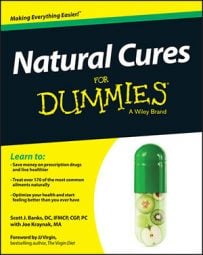Conventional science often questions the effectiveness of natural medicine by citing the dearth of well‐designed clinical studies, but natural medicine actually has a growing body of scientific evidence to back it up. This evidence comes primarily in two forms:
Randomized, double‐blind, placebo‐controlled (RDBPC) clinical trials: RDBPC studies, which test the effectiveness and safety of medications, are the gold standard in the pharmaceutical industry. More and more, these same studies are used to test the effectiveness of alternative treatments, including nutritional supplements. In the U.S., the National Institutes of Health’s National Center for Complementary and Alternative Medicine (NCCAM) is devoted exclusively to studying and reporting on the safety and effectiveness of alternative and complementary treatments; visit nccam.nih.gov for details.
RDBPC studies aren’t always suitable for testing natural treatments, however, because these treatments are often tailored to the individual patient’s needs and involve a combination of interventions, including dietary changes, nutritional support, exercise, and physical manipulation.
Investigations into human biology and physiology: Advances in technology are revealing more and more about how the human body functions and how genetic, environmental, and lifestyle variables alone and together influence health and illness.
For example, a recent study published in the journal Cell found that some of the bacteria living in the human body produce antibiotics, which help prevent and fight infections from certain harmful bacteria. This study provides additional support for the natural cures approach of supporting a healthy immune system with probiotics and avoiding the overuse of broad‐range antibiotics that kill beneficial as well as harmful bacteria.
Science not only supports the use of natural medicine, but it also drives its development. Many reputable nutraceutical manufacturers now have their own research departments to develop and test products. (A nutraceutical is a food‐based product that’s used as a medicine.)
Among other advances, this research has helped to develop vitamins and minerals that are more easily and fully absorbed by the human body, probiotics that survive stomach acid exposure so more live microorganisms can populate the gut, and formulations that provide the right mix of nutritional supplements to support the proper function of various systems in the body, including the digestive, cardiovascular, and immune systems.
Buy products only from reputable manufacturers that have researched their products for effectiveness and that adhere to strict quality‐control standards and practices; look for those that are Good Manufacturing Processes (GMP) certified. Otherwise, your body may not absorb them properly, and they may simply not work.

